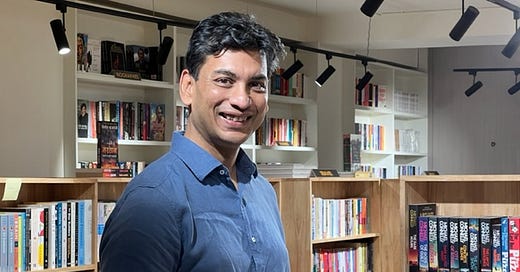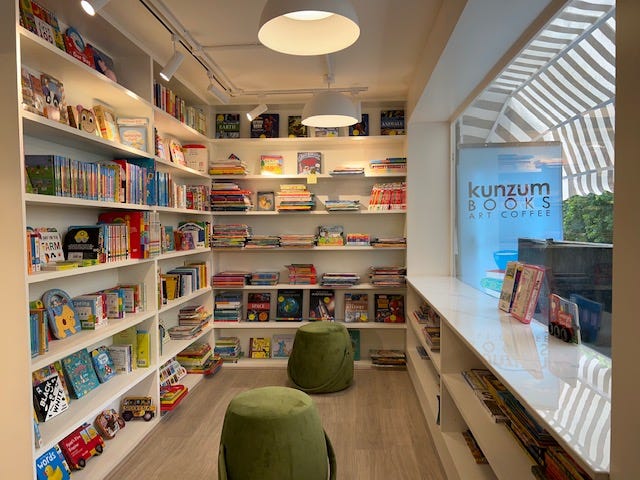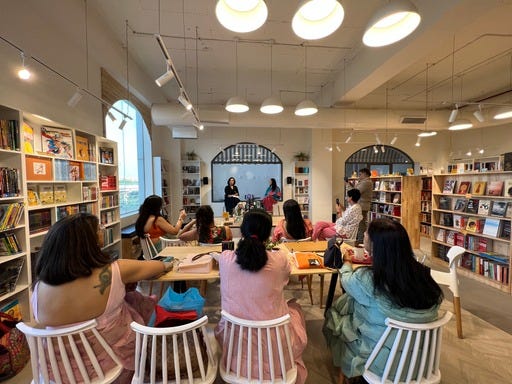The Trailblazing Story of Ajay Jain and His Quest to Ignite a Bookstore Movement in India
Residing in Delhi, India, Ajay Jain describes himself as a traveler both literally and metaphorically. Over the course of his life journey, he has developed a fervent interest in the world of books. Possessing his own skillful writing chops, he has personally authored nine printed and over fifty digital books.
The genesis of Jain’s interest in building bookstores in India dates back to 2009 while securing private gallery space for his photography and books. Despite the promise of these locales, tepid sales forced him to re-strategize his business model and direction.
The following year Kunzum Gallery was repurposed into Kunzum Travel Café, which featured a pay-as-you-like business model. Over time it has emerged as a popular travel community that offered writers, travelers, musicians, slam-poets, and other artists space to display their creative talents. It included film streamings, travel discussions, book forums, photography classes, heritage walks, and business networking events among other activities.
Fast forward ahead to 2020 and COVID-19 which hit densely populated India hard. This led to the closure of the café during the pandemic, a move Jain says was devastating for Kunzum lovers like himself.
Today, Jain is revamping the Kunzum brand again, this time as a chain of bookstores throughout the country. Undeterred by cries of “bookshops are closing, and books are not selling”, Jain began doing his own research, discovering that, to the contrary, book sales year on year were going up, not down, even amidst the pandemic.
Please share a little about you and what led to your decision to reinvent Kunzum as a bookseller.
AJ: In some ways, my life is a story/saga in itself. I have had careers in technology, sports management, and media sectors and hold degrees/certifications in mechanical engineering, management, journalism, and photography.
I took to writing books in 2007. And while my initial focus was on travel, I expanded the same to write on personal development, marketing, and fiction too. And this is how Kunzum the brand was born.
Where is the Kunzum name derived from?
AJ: It was the name of my travel blog (Kunzum is a high altitude pass in the Indian Himalayas) and publishing imprint. I set up the Kunzum Travel Café in 2010 – to serve as a gallery for my photography and books. We built a community there around events and coffee.
Tell us more about the effects of the pandemic and your decision to pivot to a bookstore model?
AJ: When the pandemic forced a shutdown, many of us took it as an opportunity to reflect upon and recalibrate our lives. During this period I focused on writing books which led me to a greater realization of their importance to society.
Tied to this discovery, I have been disappointed at the dearth of bookshops in India, particularly those environments that make book browsing a pleasing experience. It has also made things difficult for authors. In other words, how do they promote their books if distribution is scarce? And while platforms like Amazon have their value, most authors need to face their customers in order to make an impression.
So I made the decision a few months back to invest in bookshops, despite the uncertainty of the pandemic still hanging heavily upon us. I wanted to be a game-definer, and have started with five outlets at the launch stage.
Describe the reading culture in India. What are some of the most popular themes that appeal to readers?
AJ: There is no one-size-that-fits-all in a country like India – not just for books, but every other product category. We have varying levels of literacy, interest in reading, 23 major languages, and hundreds of local dialects. On the face of it, we could be the biggest market for books – and many other products – in the world, but we are not.
There are thus no standout themes that you can say are popular in India. In English books (a sizable number), children / young adults, business, and self-help / personal development are some of the biggest categories. Surprisingly, fiction is big but not as big as one would have thought it to be. I suppose we get our fix of such stories from Bollywood (and other regional language films) and television.
Who do you personally look to for inspiration in terms of your entrepreneurial aspirations?
AJ: While I have reservations on the carbon / ecological footprint of the tech industry, I would look to Steve Jobs with whom I can see an alignment of thought-process. The way he built the Apple brand is unparalleled. And his business model is perfect in terms of how Apple develops/invents products, owns the IP, and controls its own production and distribution. While we source our books from multiple publishers, in our own way that’s how we are building our brand.
What are some of the authors and books you admire?
AJ: It would be unfair to highlight only a few authors as there have been many who have made an impression on me over time. And the list keeps changing – because at different stages of my life, I have felt an affinity with different authors/genres/titles. Growing up, I had my fix of Hardy Boys by Franklin W. Dixon, The Three Investigators by Alfred Hitchcock, much of Enid Blyton, James Hadley Chase, Sidney Sheldon, Jeffrey Archer, Ayn Rand, and more. In the recent past, I have been impressed by the likes of Amor Towles, Sally Rooney, and Fredrik Backman among others.
Where are you planning to locate these stores?
AJ: We are identifying areas with a significant population of English-literate, middle to upper-class residents because much of our curation is in the language. We have a smaller Hindi section. The first set of stores is coming up in the greater New Delhi area, the capital of the country. Over time, we will expand to other cities – both big and not-so-big. (There is no such thing as a small city in India – there are just too many of us!)
How are you identifying funding opportunities?
AJ: I am using my own funds initially to establish the proof of concept – at this stage, investors will interfere with our vision creation as we are trying to come up with our own way of doing business. Once we are recognized as a success, we will seek private equity infusion – but only when we feel we will get the valuation we deserve.
What is your grand vision for Kunzum’s expansion in India?
AJ: It is best captured in our Kunzum's Mission Statement: Bookshops are vital to shaping the culture and character of societies and individuals. This belief has driven us to invest in such community spaces and thus do our bit to make ours a better world to live in.








Kunzum has been a blessing for bibliophiles ever since the first bookstore opened this March. It sure lives up to its #365daysLitFest tag. More power to you and your team, Ajay...
Congrats Ajay. This is the start of something big. More power to you!